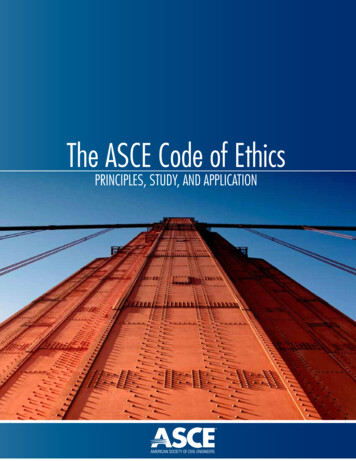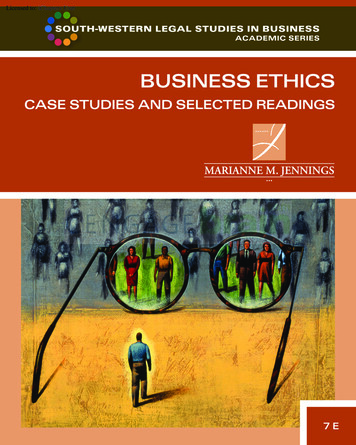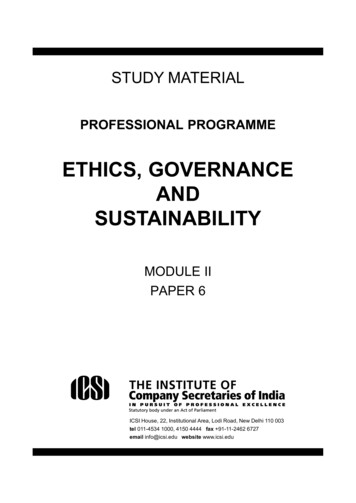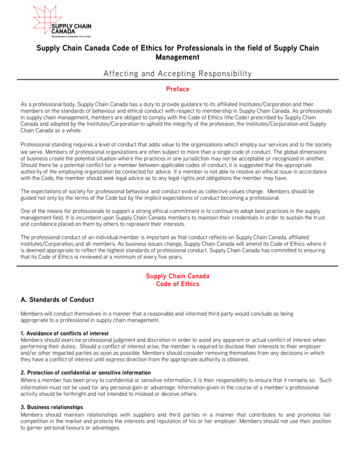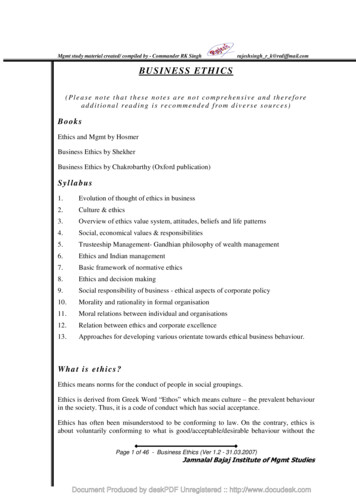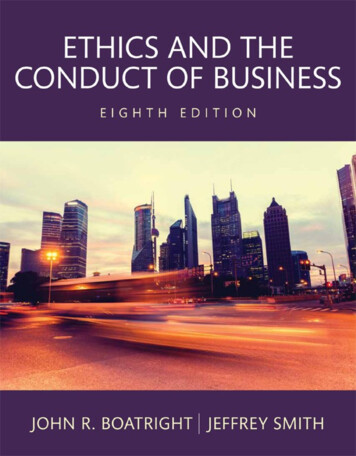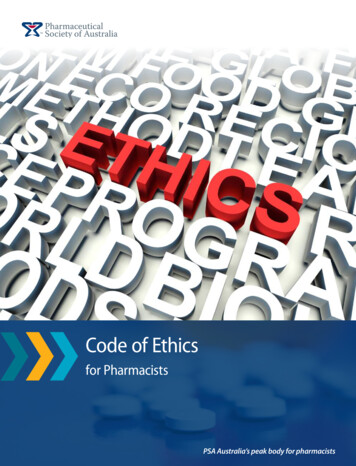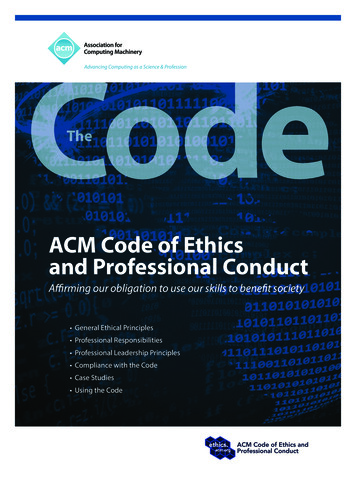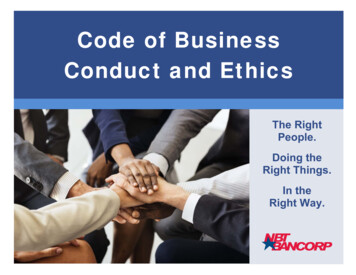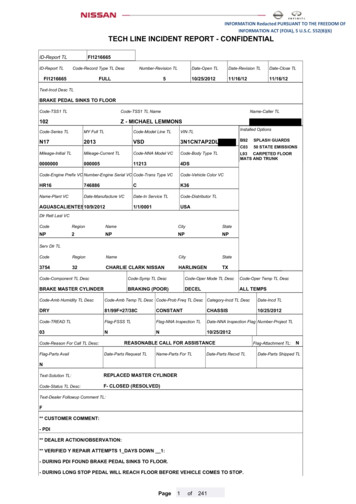
Transcription
Code of EthicsThe way we work3rd Edition1
CONTENTS3 THE L’ORÉAL SPIRIT21 Representing the Company4 Forewords22 Privacy and data protectionby Jean-Paul Agonby Emmanuel Lulin5 by the Executive Committee6 Who does this Code apply to?6 How to use this Code7 I HAVE A CONCERN: OPEN TALK8 Working together8 Respecting human rights8 Respecting local laws and customs9 RESPECTING OUR COMMITMENTSAS A BUSINESS10 Product safety and quality11 Advertising and marketing13 Supplier selection and fair treatment of suppliers24 Use of Company resources25 Financial and business recordsand the fight against money laundering26 Insider trading27 Tax28 RESPECTING OUR COMMITMENTSAS AN EMPLOYER29 Health, safety and security30 Diversity32 Harassment and bullying33 Sexual harassment34 RESPECTING OUR COMMITMENTSAS A RESPONSIBLE CORPORATE CITIZEN14 Fair competition35 Political activities and lobbying16 Conflicts of interests36 Environmental stewardship18 Gifts and entertainment37 Contribution to the community19 Bribery and facilitation payments20 Confidential information238 THE MANAGER’S ROLE
The way we workTHE L’ORÉAL SPIRITL’ORÉAL has set itself the mission of offering all women and men worldwide the best of cosmetics innovationin terms of quality, efficacy and safety. Our ambition for the coming years is to win over another one billionconsumers around the world by creating the cosmetic products that meet the infinite diversity of their beautyneeds and desires. Our identity and reputation are based on strong Values and Ethical Principles. Our Valuesare Passion, Innovation, Entrepreneurial Spirit, Open-Mindedness, Quest for Excellence and Responsibility.Our Ethical Principles are Integrity, Respect, Courage and Transparency.AS A BUSINESSOur strategy for leadership is based on continuous investment in our research and development. This enablesour brands to deliver to our consumers products that are innovative, highly effective, practical and pleasant touse, and which are manufactured to the most demanding standards of quality and safety. We place great valueon honesty and clarity: our consumer advertising is based on proven performance and by scientific data. We arecommitted to building strong and lasting relationships with our customers and our suppliers, founded on trustand mutual benefit. We respect the stakeholders of our business environment, including our competitors. We dobusiness with integrity: we respect the laws of the countries in which we operate and adhere to good corporategovernance practices. We maintain high standards in accounting and reporting, and support the fight againstcorruption. We deliver long-term, sustained shareholder value by protecting and making the most effective useof Company assets. We aim for excellence, and constantly challenge ourselves and our methods.AS AN EMPLOYERWe aim to make L’ORÉAL a great place in which to work. We know that our employees are our greatest assets. Theyare entitled to a safe and healthy working environment: one in which personal talent and merit are recognised,diversity is valued, privacy is respected, and the balance between professional and personal life is taken intoaccount. We believe in offering our employees a stimulating environment, exciting personal opportunities anda chance to make a difference. We encourage an atmosphere of openness, courage, generosity and respect, sothat all our employees feel free to come forward with their questions, ideas and concerns.AS A RESPONSIBLE CORPORATE CITIZENWe play our part in creating a world of beauty and fairness. We are mindful of our impact on the naturalenvironment, including biodiversity, and constantly seek to reduce it: we are determined to avoid compromisingtomorrow for the sake of today. We make a positive contribution to the countries and communities in whichwe are present, and respect local cultures and sensitivities. We are committed to the respect of Human Rights.We want to help end the exploitation of children in the workplace and the use of forced labour. We want an endto animal testing in our industry, and we contribute to the development and acceptance of alternative methods.We actively seek out and favour business partners who share our values and our ethical commitments.This is the spirit in which we operate: The L’ORÉAL SPIRIT3
FOREWORDSBY JEAN-PAUL AGONInthe 21st century, only companies that have integrated ethics in their culture,strategy and day-to-day practices will be sustainable.Our ambition is to be one of the most exemplary companies worldwide. Our ethicsprogram is already recognized and places us amongst the world’s leading companiesin this field.Our strong ethical culture is one of the pillars of the New L’ORÉAL. This is why wemust clearly state our commitments as a business, as an employer and as a corporatecitizen.Our Ethical Principles - Integrity, Respect, Courage and Transparency – will allow usto continue be a Group which inspires trust.The Code of Ethics applies to all of us, wherever we work and whatever our job – whether we are a new employee,a Management Committee member, and up to the Board of Directors.The Code of Ethics is our reference document, to inspire our choices and to guide our day-to-day actions.Read this Code carefully. Live it. Pass it on. Respect it and make sure it is respected around you.L’ORÉAL needs everyone’s exemplarity to be exemplary.JEAN-PAUL AGONChairman and Chief Executive OfficerChairman of the L’ORÉAL FoundationBY EMMANUEL LULINOur Code of Ethics is a living and shared document that covers subjects that are essential to our culture ofloyalty, trust and solidarity. It aims to help us understand what is expected of us as L’ORÉAL employees, bysetting out the general principles and through numerous practical day-to-day examples.Beyond this document, you have at your disposal a dedicated intranet site (http://ethics.loreal.wans) and trainings. Ethics Correspondents in each Country help us tolive our Code.Ethics however is an essential duty of each and every one of us.For many years, we have also come together during Ethics Day. More and more ofyou participate in this event which has become a key date in the Group’s calendar.All employees and entities must work together in a respectful and open manner.Credit must be given to other people’s ideas. We should listen with generosity andshare information as needed, subject to our rules on confidentiality.Ethical issues are rarely simple. Our strength is to have the courage to address them. Do not keep these questionsfor yourselves: speak up and ask for advice.You will always be supported in this process.EMMANUEL LULINSenior Vice-President and Chief Ethics Officer4
The way we workBY THE EXECUTIVE COMMITTEEWe are committed to live out theCode of Ethics in our day to day work.It is crucially important to L’ORÉAL’ssuccess.Ethics applies to the behaviourof all L’ORÉAL Group employees,everywhere in the world, at all levelsof the Company, without exception.It covers all L’ORÉAL’s activities, fromresearch, innovation and design of ourproducts to their manufacturing andmarketing, from human resources toour operations, from administrationand finance to sustainabledevelopment, from communicationand public affairs to digital.Each of us, as an ambassador andmember of the L’ORÉAL community,makes a personal commitment tofollow this Code, both in letter andspirit.You should always remember that: t he ethical principles set out inthis document are not optional:you must respect them you set the example: L’ORÉAL’sreputation, the trust of all ourstakeholders, depend on each of us you will be evaluated not only onwhat you do but also on how youdo it235781946 - ISABEL MAREY-SEMPERExecutive Vice-PresidentCommunication,Sustainability and PublicAffairs, General Managerof the L’ORÉAL Foundation2 - BARBARA LAVERNOSExecutive Vice-PresidentOperations3 - JOCHEN ZAUMSEILExecutive Vice-PresidentWestern Europe Zone4 - ALEXIS PERAKIS-VALATExecutive Vice-PresidentAsia-Pacific Zone5 - JÉRÔME TIXIERExecutive Vice-PresidentHuman Relations andAdvisor to the Chairman131261 - JEAN-PAUL AGONChairman and CEOChairman of the L’ORÉALFoundation1510 117 - MARC MENESGUENPresident ConsumerProducts Division8 - NICOLAS HIERONIMUSPresident SelectiveDivisions9 - CHRISTIAN MULLIEZExecutive Vice-PresidentAdministration and Finance10 - LAURENT ATTALExecutive Vice-PresidentResearch and Innovation161411 - ALEXANDRE POPOFFExecutive Vice-PresidentEastern Europe Zone12 - BRIGITTE LIBERMANPresident Active CosmeticsDivision13 - GEOFF SKINGSLEYExecutive Vice-PresidentAfrica, Middle East Zone14 - LUBOMIRA ROCHETChief Digital Officer15 - FRÉDÉRIC ROZÉExecutive Vice-PresidentAmericas Zone16 - AN VERHULST-SANTOSPresident ProfessionalProducts Division5
WHO DOESTHIS CODE APPLY TO?The Code of Ethics applies to all employees of theL’ORÉAL Group and its subsidiaries worldwide. Italso applies to all corporate officers and membersof the Executive and Management Committees ofthe L’ORÉAL Group and its subsidiaries worldwide.Moreover, the Code of Ethics applies to all employeesand corporate officers of the L’ORÉAL Foundation.The term “L’ORÉAL” used in this document refers toall subsidiaries of the L’ORÉAL Group and L’ORÉALFoundation. In order to allow as many employees aspossible to read the Code of Ethics in their mothertongue, the Code of Ethics is currently available in45 translations. The UK English version of this Codeis the reference document.The Code of Ethics is publically available onL’ORÉAL’s corporate website.HOWTO USE THIS CODEL’ORÉAL operates in many countries – home to awide variety of cultures, laws and political systems.We as a business and as individuals in theperformance of our duties must always respectthe laws and regulations of the countries in whichL’ORÉAL operates.We recognise that some situations are not easy.Ethics is often about arbitrating a conflict ofprinciples. Our Code of Ethics sets standards for theGroup in a number of “grey areas”, where, beyond thelaw, a discretionary decision is required.Read all of the Code to learn about L’ORÉAL’s ethicalexpectations and standards, and then keep a copyfor yourself for future reference should you have anyquestions or concerns.Of course, no document can anticipate and addressevery situation that may arise. So whenever you arefaced with this type of decision, ask yourself thefollowing questions:1. Is it in line with the Code of Ethics?2. Is it legal?3. I s it in line with our Ethical Principles of Integrity,Respect, Courage and Transparency?4. H ow would my actions affect our stakeholders andcould I justify my decision?5. W ould I be comfortable if my decision was madepublic internally or externally?6If the answer to one of these questions is no, or ifyou have any doubts, the golden rule is to consultthe appropriate people (your management, internalexperts, Ethics Correspondent, etc.) and discussthe matter openly before acting (see also “I Havea Concern: Open Talk”).The Code of Ethics does not replace any existingpolicies, and you should continue to refer to whateverrules and standards have been set in your workplace.This Code aims to provide a framework for thesepolicies and standards, so that it is easier for you tounderstand the rationale behind them.L’ORÉAL acknowledges that the Code of Ethics isnot exhaustive and that its content may change fromtime to time.L’ORÉAL reserves the right to change the Code ofEthics at any time, with or without notice, and theright to take whatever action it deems appropriatein a given situation, subject to not contraveningL’ORÉAL’s Ethical Principles.
The way we workI HAVEA CONCERNL’ORÉAL encourages a culture of openness whereemployees can raise their genuine concerns.We encourage all employees to express their views,defend their opinions and point out unacceptablebehaviours and demands.Employees may have concerns about certainpractices and need advice and guidance to helpresolve them. It is our policy that all reports ofmisconduct on the part of the Company, one ofits employees or even a third party with which theCompany is in contact are thoroughly investigated,and that appropriate actions are taken, regardless ofthe people involved.“Good faith” means that you have providedinformation that you believe to be comprehensive,honest and accurate at the time, even if you are laterproven to be mistaken.We will ensure a fair process in the case ofan investigation, respecting the principlesof confidentiality and presumption of innocence.Any investigation will also comply with applicablelocal legislation, especially regarding due process.During an ethical investigation, the full cooperation ofeveryone involved is mandatory and all informationand documents must be immediately provided uponfirst request.The normal route for raising such issues is via youroperational or functional management. You can alsocontact your Human Resources Manager or yourEthics Correspondent. There may also be additionalresources available in your country, such as staffrepresentatives.The person implicated will be informed of thenature of the allegations made against him/her.The information may not be provided immediatelyshould it prove necessary, for example, to check thefacts, preserve evidence or contact the competentauthorities.Your Country Manager or, for Corporate or Zonestaff, the member of the Group’s ExecutiveCommittee to which you report, is responsiblefor ensuring the respect of the Code of Ethics;if necessary, you can contact him or her.All information communicated will be shared onlywith those persons who have a legitimate reason toknow either to ensure the concern is handled and/orthe appropriate steps are taken.In exceptional cases, if your concern cannot behandled through normal channels, you can directlycontact the Chief Ethics Officer via the secure Website: www.lorealethics.comAny employee raising such concerns in good faithwill be protected against retaliation. Any employeewho believes he/she is being retaliated against mustimmediately report this by the same channels asindicated above.We will provide the results of the investigation tothe individual who has raised the concern to theextent that it is appropriate and can be given withoutinfringing legal requirements or other duties ofconfidentiality.Any accusations that prove to be slanderous or madein bad faith may result in disciplinary proceedings.7
WORKINGTOGETHERWe expect all employees and entities to worktogether in a respectful and open manner.Teamwork is encouraged and successes, as well asfailures, should be shared.We should all aim to give credit to other people’sideas, and recognise the contributions of others.We should listen with generosity and shareinformation as needed, subject to the Group’s ruleson confidentiality.Lack of respect, in particular through abusive speechor inappropriate gestures or racist, discriminatoryor sexual remarks, is unacceptable. Disparagementof colleagues is also contrary to L’ORÉAL’s ethics.In this way, we will maintain a culture of loyalty,trust, solidarity and respect for cultural differencesthroughout our business.RESPECTINGHUMAN RIGHTSWe are committed to respecting and promotingHuman Rights, namely by reference to the UniversalDeclaration of Human Rights dated December 10,1948, and the United Nations Guiding Principles onBusiness and Human Rights dated June 16, 2011.We have been a signatory to the United NationsGlobal Compact since 2003 and we support the UNWomen’s Empowerment Principles.We are present in many countries, and we areparticularly vigilant on issues covered by theFundamental Conventions of the International LabourOrganization (prohibition of child labour and forcedlabour, respect of freedom of association), promotionof diversity, women’s rights, respect for the rightsof people to use their natural resources and the rightto health.RESPECTINGLOCAL LAWS AND CUSTOMSL’ORÉAL is particularly attached to the spirit and theletter of laws governing quality, health and safetystandards, labour law, the environment, corruptionand money-laundering, data privacy, taxation,accurate communication of financial and nonfinancial information and fair competition.L’ORÉAL seeks to share these principles with itsbusiness partners and to ensure that such partnersalso respect these laws and regulations.We should also ensure, wherever possible, that weconduct our activities in a manner that is sensitive tothe cultural and social traditions of communities withwhich we come into contact.8There may be instances when the guidance in thisCode is at variance with the local law or customs ofa particular country. If that is the case, where locallaw or customs impose higher standards than thoseset out in the Code, local law and customs shouldalways apply. If, by contrast, the Code provides for ahigher standard, it should prevail, unless this resultsin illegal activity.
The way we workRESPECTING OUR COMMITMENTS AS A BUSINESS“We aim for excellence, and constantlychallenge ourselves and our methods.”Table of contentsPAG E 1 0Product safety andqualityPAG E 1 8Gifts and entertainmentPAG E 2 4Use of CompanyresourcesPAG E 1 9PAG E 1 1Advertising andmarketingBribery and facilitationpaymentsPAG E 2 0PAG E 1 3Supplier selection andfair treatment of suppliersPAG E 1 4Fair competitionConfidential informationPAG E 2 5Financial and businessrecords and the fightagainst money launderingPAG E 2 6PAG E 2 1Representingthe CompanyInsider tradingPAG E 2 7TaxPAG E 2 2PAG E 1 6Conflicts of interestsPrivacy and dataprotection9
As a businessPRODUCTSAFETY & QUALITYProduct safety and quality has always been paramount at all times.It is the superior performance, quality and safety of our products that demonstrate our dedication and respectfor our consumers, that maintain their trust, underpin the reputation of our brands and ensure that L’ORÉALremains the leader in our field.We are committed to marketing products that have proven efficacy and safety, guaranteed by rigorousevaluation methods. Every L’ORÉAL employee involved in product development, manufacturing, marketingand sales must seek to achieve total product quality, from its conception to its distribution, even after it hasbeen put on the market.We must Comply with all national and international legislativeand regulatory requirements to ensure theconformity of all our products Ensure that the highest standards of hygiene andstrict quality controls are applied at each stage,from product development to manufacturing anddistribution process If we know of a claim from a consumer, ask himor her to contact the appropriate ConsumerDepartment and when this claim appears tobe a potential health or safety concern, ensurewe immediately inform our manager or theInternational Cosmeto-Vigilance DepartmentWe must not- Limit a free and open exchange of views on productsafety so that no safety issue is ignored- Ignore any potential concerns about product safety,tolerance and quality control issues- Answer media questions (including those fromsocial media) on our products if we are notcompetent and authorised to do soEthical?1.1 - I work on the production line. I’ve noticedsome defective finished goods. A machine may begenerating some quality problems. I know we’resupposed to stop production when that happens, butmy supervisor has not taken any action. I know thatthe production schedule is very tight. Should I trustthat she knows what she’s doing in ignoring it?L’ORÉAL has put in place quality controls at eachstage of the manufacturing process to ensure that ourcustomers obtain the highest quality products. Qualitycomes first, regardless of production schedules. Youshould put that line on hold without any hesitation,openly share the problem with your manager, and workwith her and the rest of the team to fix the issue, beforecarrying on with production.101.2 - We have received a report from a supplierstating that contamination may have occurred ina recent shipment of raw materials. The productscontaining these raw materials have already beenshipped to our customer and there is no concreteevidence of contamination in our products. Do wehave an obligation to recall the entire production run?At L’ORÉAL, we respond promptly to any concernabout possible product safety. You should discussthe issue with your manager or your Quality ControlManager immediately.1.3 - I was just contacted by a consumer who had thewrong telephone number. He told me that he had hadan allergic reaction after using one of our products.What should I do?Give this consumer the number of the appropriateconsumer helpline and encourage him to contact themimmediately. As well, send this information yourselfto the International Cosmeto-Vigilance Department.At L’ORÉAL, after a detailed study of the eventualcausal relationship with our products, we sometimescan decide to adjust the composition of a product tocorrect some undesired effects, even if very mild, inorder to guarantee to our consumers that they can useour products with the fullest confidence.1.4 - I am often asked by my family and friends aboutour position on animal testing I don’t know what totell them. Whom should I approach about this?L’ORÉAL no longer tests on animals any of its productsor any of its ingredients, anywhere in the world.Nor does L’ORÉAL delegate this task to others. Anexception could only be made if regulatory authoritiesdemanded it for safety or regulatory purposes. If youhave any questions on this subject, you can contactyour Public Relations Director. Remember: you shouldbe careful when speaking on topics outside your areaof expertise (see the chapter on “Representing theCompany”).Who to contact: If you have a concern aboutproduct quality and/or safety, don’t keep it toyourself. Speak to your manager, your QualityControl Manager, your Legal Director, yourScientific Director, your Human ResourcesManager or your Ethics Correspondent;they will be able to help and support you (see alsothe chapter on “I Have a Concern: Open Talk”).
The way we workADVERTISING& MARKETINGThe success of our products is based on their intrinsic characteristics and performance. This principle isessential to winning and keeping consumer trust and loyalty. We want to communicate responsibly byrespecting the infinite diversity of beauty needs and desires in the world. We do not promote a single orunattainable model of beauty.We mustWe must not F ollow internal validation processes for advertisingand claims even if it delays a product launch- Seek to exploit the gullibility, lack of knowledge orlack of experience of consumers E nsure that all advertising and promotionalmaterial is based on proven performance andrelevant scientific data obtained during evaluations,consumer or laboratory studies carried out inaccordance with our industry’s best practices- Assert in our advertising that the use of ourproducts will confer a substantial professional orsocial advantage or that our products are necessaryfor overcoming personal problems or being sociallyaccepted G ive a fair, precise and truthful description of ourproducts and their effects- Undermine human dignity in our advertising orpresent degrading stereotypes C learly express the purpose and correct usageof our products and take care that it is readilyunderstood by consumers- Advertise in certain media or around programmeswhose appeal strategy is based on violence, sex,superstition or the incitement of hatred towardanyone. Such strategies are contrary to L’ORÉAL’sEthical Principles E nsure that our brands promote the largest numberof beauty types B e sensitive to the possible reaction of religious,ethnic, cultural or social groups to our advertising T ake great care to ensure our actions are consistentwith our Ethical Principles if we are promotingproducts for children and young people B e especially vigilant regarding the workingconditions of the children who may appear in ouradvertising T ake care when using animals in our advertising; inparticular not have recourse to threatened speciesor animals whose training conditions are clearlyunacceptable- Have children appear in advertising for a productthat has not been tested for use on children unless itis clear in the advertisement that the product is notintended for children- Specifically target very young children in ouradvertising and promotions, except for sunscreenand hygiene products- Deliberately exaggerate claims in ourcommunications, including environmentalor societal claims- Collect information for behavioural marketingpurposes without first informing Internet users(e.g., using cookies) D esign our sales promotions and direct marketingoperations so that consumers can easily understandthe conditions of the offer P rotect our consumers’ personal data (see thechapter on Privacy and Data Protection) R efrain from making disparaging remarksconcerning competitors (including any falsestatements concerning their products or services)11
As a businessEthical?2.1 - My colleague has shown me a marketingproposal for a body lotion that uses an extremelythin young model. I think it’s distasteful in the least,and could lead us to accusations of encouraging girlsto starve themselves in pursuit of an unhealthily thinphysique. She said I was being over-sensitive and thatthe artwork had already been approved. What can Ido about it?Our advertising and promotion is designed tohave the maximum impact possible on our desiredaudience. We must therefore take responsibility forall the messages it communicates - or is seen tocommunicate. There is growing concern about eatingdisorders among young women, and the health risksassociated with this. This has to be taken into accountwhen deciding on our advertising campaigns. We donot knowingly work with models who are under theage of 16 years except for specific advertising such assunscreen for children, or models who clearly appearto have a serious eating disorder. We also avoid anyadvertising that promotes drugs, alcohol or smoking.You should encourage your colleague to get a secondopinion. You can also raise it with your manager.2.2 - In an advertisement for a hair styling product,the model is going to wear a natural hair wig, andwe will also photoshop her picture because her skinhas blemishes. Is it acceptable when it comes to thesincerity of our claims?Some retouching is necessary at times from a technicalperspective, but they should not at all be misleading asto the performance of the product being advertised.Using a natural hair wig is acceptable because it is anadvertisement for a styling product and is not relatedto hair volume. It is important that the wig used is madeof real hair and coloured or styled with the productsbeing advertised. Beware however of the origin of thenatural hair used to make wigs, which can sometimesbe controversial.2.3 - I’m just devising a marketing programmefor a new product. The R&I department managerhas said that it only “reduces wrinkles”, but mymanager has told me to say it “eliminates wrinkles”.I’m concerned that this isn’t entirely truthful. Whatshould I do?We act in line with both the Consolidated Code of theInternational Chamber of Commerce on Advertisingand Business Communication Practices, and alsothe Charter and Guiding Principles on ResponsibleAdvertising and Marketing Communication of CosmeticsEurope. Overselling our products by making inflatedor exaggerated claims for them is dishonest, createsdistrust among our customer base and could beconsidered misleading. If the product does not eliminatewrinkles, then you should not claim that it does.122.4 - I would like to include in an advertisementthe fact that a product does not containhexachlorophene, which is not surprising since theuse of this ingredient is prohibited by law. However,it sounds good to consumers. But I have colleagueswho think that it is a borderline claim. Who is right?We cannot lead people to believe that our productshave a specific property when this property comesfrom simply respecting the law. It would be misleadingfor our consumers. Your colleagues are right.2.5 - I am currently working on an advertisementthat takes place in a religious setting. The consumerstargeted by this advertisement will probably like itsprovocative style, and in my country, I don’t thinkit will offend anyone. However, I have a foreigncolleague who finds it a bit borderline. What shouldI do?We should evaluate our advertisements not only fromour target consumers’ point of view, but also from theview of society overall. Our adverts are viewed by manymore people than only our targeted market. We mustalso take into account our international presence andnot use themes that could be considered acceptablein one country, but extremely shocking in anothercountry in which we operate. Lastly, we should not useimages, symbols or themes that could be consideredgratuitously offensive, demeaning or disrespectful of areligion, nationality, culture, minority group or disability.The best thing would be to obtain an objectiveopinion, specifically via a panel before validatingthis advertisement and to pay attention to how thisadvertisement is disseminated.2.6 - A famous brand of children’s clothing islaunching a line of dresses for little girls and wantsto buy lip gloss to offer them to their customers ifthey purchase over a certain amount. This is a goodopportunity, right?There is a growing debate about the early sexualisationof young children. Although young children havealways wanted to imitate adults, especially by playingdress up with make-up and perfume, we believe thatit must remain a game, and, for that reason, we shouldnot encourage the daily use of cosmetics in youngpeople except for hygiene and sunscreen products.Therefore, it is best to avoid associating our brands withobjects, themes or events aimed at young children. Forexample, we do not supply products for “Mini-Miss”type contests.Who to contact: If you have a concern aboutadvertising
2 CONTENTS 3 THE L’ORÉAL SPIRIT 4 Forewords by Jean-Paul Agon by Emmanuel Lulin 5 by the Executive Committee 6 Who does this Code apply to? 6 How to use this Code 7 I HAVE A CONCERN: OPEN TALK 8 Working together 8 Respecting human rights 8 Respecting local laws and customs 9 RESPECT

